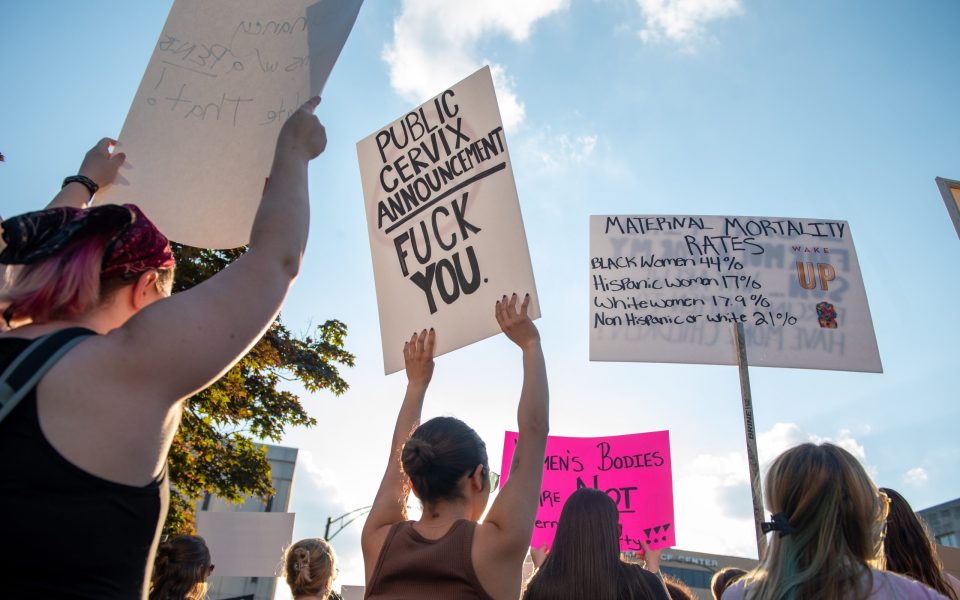Featured photo: Protestors hold up signs decrying the Supreme Court’s decision to overturn Roe V. Wade at the Greensboro rally for reproductive rights in Greensboro N.C., on June 24, 2022. (photo by Juliet Coen)
This story was originally published by NC Newsline. Story by Lynn Bonner
The new abortion restrictions that North Carolina Republican lawmakers are ready to adopt are more complicated than the post-12-week ban they described at a news conference Tuesday evening.
The bill also imposes new restrictions on access for people who seek abortions throughout their pregnancies, including those who use abortion pills. New licensing requirements for abortion clinics could also force many now operating in the state to shut down.
One Republican legislator said Tuesday that the requirements for medication abortions would not change.
“It is, in my words, a lie,” Molly Rivera, a spokeswoman for Planned Parenthood South Atlantic said in a telephone interview Wednesday morning. “The framing that they’re leaving it alone before 12 weeks is extremely untrue,” she said. “This makes it hard for someone to get an abortion.”
New limits on medication abortions
Under Senate bill 20, a patient seeking a medication abortion would be required to have three in-person visits with a doctor, up from the single visit now required.
The FDA allows use of abortion pills up to 10 weeks into fetal gestation. A majority of patients in North Carolina who obtain abortions use abortion pills, according to the CDC.

The FDA does not require in-person visits, and many OB/GYNs in North Carolina who provide abortion care say current state law requirements — prohibiting telehealth visits, mandating the presence of a doctor when a patient takes the first pill, specifying that that only doctors can dispense the pills — are medically unnecessary and already create too many hurdles to access.
The Republican bill unveiled this week would require that patients: see doctors at least 72 hours before taking the first pill, take the first pill in the presence of a doctor, then return for a follow-up visit 7 to 14 days later. Patients must also be given “a real-time view of the child and heart tone monitoring.”
The three-visit requirement “effectively bans abortion for most working women, certainly all the women coming into North Carolina from out of state,” Sen. Julie Mayfield said during a legislative committee debate on the bill Wednesday morning. “This bill does in fact reduce options available to women and prevent them from making the best decision for themselves and their families,” the Buncombe County Democrat said.
There’s no evidence that the 72-hour waiting period increases patient safety, or that patients change their minds, said Dr. Beverly Gray, a Duke University OB/GYN.
“The goal of having people show up in person is to prevent people from traveling,” Gray said in an interview Wednesday.
Other proposed restrictions would be burdensome
New limitations in the bill on early term abortions are not limited to use of abortion pills. Throughout the bill, there are also explicit instructions on what doctors should tell patients, and requirements for documenting those exchanges.
Patients are already making thoughtful decisions with doctors’ counsel, Gray said. The bill “makes the assertion that we’re not providing that,” she said. “This is so disrespectful to our profession.”
Under the bill, all surgical abortions, also called “procedural abortions,” performed through the 12th week must take place in a hospital, ambulatory surgical facility, or a licensed abortion clinic. All abortions after 12 weeks must be performed in a hospital.
Abortions would be legal up to 20 weeks in cases of rape or incest, and up to 24 weeks in cases of life-threatening fetal anomalies. House Democratic leader Robert Reives objected to the process. Sen. Vickie Sawyer (R) said Democrats were discounting the work she had put into the legislation.”We’ve had these discussions. We know what you would have said if we came to you. You never would have voted for these bills,” said Sawyer in Wednesday’s Rules Committee.


The bill would also require the state to create an abortion clinic license that would require annual renewals. The licensing requirements could not be more strict than the requirements for ambulatory surgical centers. But if the requirements for abortion clinics are equivalent to those for ambulatory surgical centers, Planned Parenthood clinics would not meet them, Rivera said.
“This is significant,” she said. “We think this is aimed at shutting down clinics.”
As present, abortion clinics are located in only nine of the state’s 100 counties, and some people must travel hundreds of miles to get to one.
The text of the bill was not publicly available until about 10 p.m. Tuesday. The first committee debate was Wednesday morning. Members of the public commented, but no amendments were allowed.
The House planned to vote Wednesday afternoon.
Democratic legislators said the turnaround of less than 24-hours was a ridiculously short time to consider a controversial bill that they had no say in and will have a considerable impact on people’s lives.
“I just don’t believe this is how democracy should work,” said House Democratic leader Robert Reives.
Bonus content: Click below to hear Rep. Ashton Wheeler-Clemmons speak on the bill
NC Newsline is part of States Newsroom, a network of news bureaus supported by grants and a coalition of donors as a 501c(3) public charity. NC Newsline maintains editorial independence. Contact Editor Rob Schofield for questions: [email protected]. Follow NC Newsline on Facebook and Twitter.
Join the First Amendment Society, a membership that goes directly to funding TCB‘s newsroom.
We believe that reporting can save the world.
The TCB First Amendment Society recognizes the vital role of a free, unfettered press with a bundling of local experiences designed to build community, and unique engagements with our newsroom that will help you understand, and shape, local journalism’s critical role in uplifting the people in our cities.
All revenue goes directly into the newsroom as reporters’ salaries and freelance commissions.


Leave a Reply